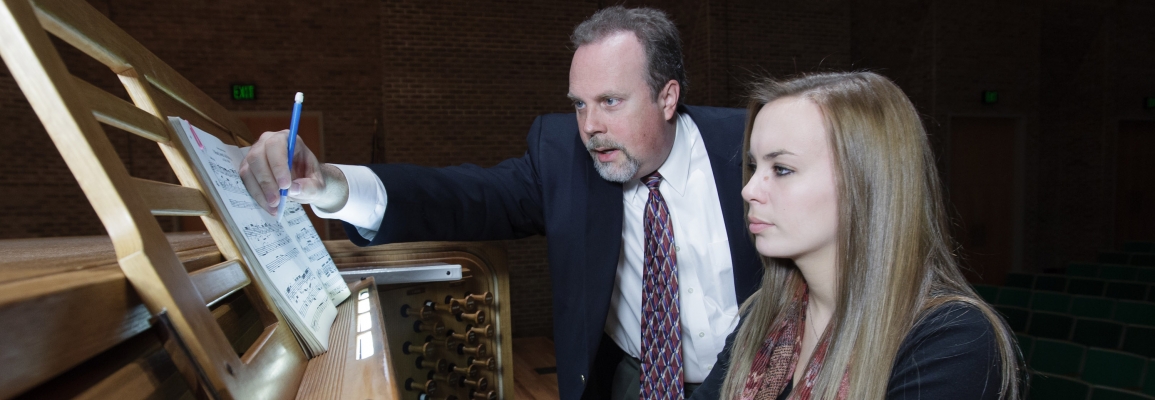Bachelor of Music in Music Performance
The Bachelor of Music in Music Performance degree provides skilled musicians with opportunities to develop expertise as professional performers or composers of solo, chamber, jazz and large ensemble music; as directors and performers of church music; or as university-level faculty following graduate study.
There are five concentrations within the Bachelor of Music in Music Performance degree program:
- Instrumental
- Vocal
- Sacred Music
- Theory/Composition
- Jazz Studies (NEW - courses begin in Fall 2025!)
Fast Facts
- Students in all concentrations learn from faculty who are also active performers nationally and internationally.
- Alumni perform regionally, nationally and internationally with opera companies, symphony orchestras and other ensembles.
- Composition and theory students perform their works regularly in on-campus recitals.
- Jazz students have the opportunity to play and receive masterclasses from esteemed visiting guest artists.
- More than half of sacred music majors continue on to graduate school or seminary.
Admissions
In addition to the general Appalachian State University application, any student interested in being considered as a music major, regardless of degree program, must audition successfully before the Hayes School of Music faculty. Click here for information on auditions.
Accelerated Bachelor to Master of Music Performance Program
Students from any undergraduate music program can be considered for accelerated bachelor to the graduate MM in Performance program after their second year of study. To apply, students should contact Graduate Program Director Dakota Corbliss (corblissdc@appstate.edu) to establish a program of study and verify credit eligibility requirements.
Costs
Appalachian offers an outstanding education at a great price. See why national publications consider us a "best value."
Music Scholarships
Classes
Classes in the Bachelor of Music in Music Performance degree program include the Hayes School of Music's core curriculum: private instrument/voice study, ensemble participation, music theory and aural skills, music history, world music and other musicianship classes.
In addition, each concentration has special courses or features:
Instrumental
Studio lessons focus toward solo performance recitals in the junior and senior year.
Vocal
Studio lessons focus toward solo performance recitals in the junior and senior year.
Sacred Music
Studio lessons focus toward solo performance recitals in the junior and senior year. Specialized classes and an internship prepare students in this concentration for careers in sacred music.
Composition and Theory
Students participate in a weekly composition seminar with all theory/composition majors. They also receive weekly private composition lessons and take upper-division courses designed for composers and music theorists.
Jazz Studies (NEW! Instruction begins in Fall 2024)
Students take jazz lessons with jazz faculty as well as traditional applied lessons that are instrument-specific, culminating in recitals in the junior and senior year. The coursework includes instruction in the history, theory, and business of jazz.
More information
- Programs of Study
- A four-year course plan and other details are found in the Hayes School of Music Student Handbook.
- Course descriptions and advising information are found in the Undergraduate Bulletin under the Hayes School of Music.
Careers
Instrumental and Vocal
- Alumni perform as professional musicians regionally, nationally and internationally with opera companies, symphony orchestras, and other ensembles. These include New York Polyphony, New York City Opera and the North Carolina Symphony.
- Many graduates also choose to attend graduate school, receiving significant scholarship funding to study at Florida State, Maryland, Indiana, San Francisco Conservatory, Boston Conservatory, Texas and Alabama and other institutions. With advanced degrees, many also choose to teach at the university level. Graduates are now on the faculty at University of Kansas, Furman University, Wingate University and Appalachian, among other institutions.
Sacred Music
- Graduates typically seek careers as organists or choral directors with congregations throughout the region and nation. After graduation, more than half of Sacred Music majors continue on to graduate school or to seminary.
Theory/Composition
- Alumni have gone on to work as professional composers and arrangers, university professors of composition, and video and game composers.
Get Help
- For assistance in finding internship, career and graduate school opportunities, visit Appalachian's Career Development Center.
- More about music careers
